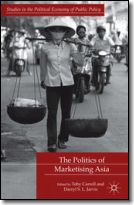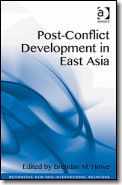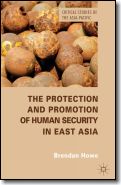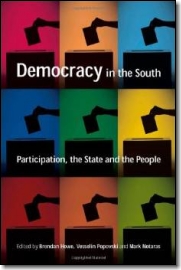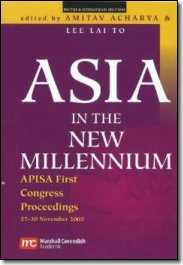The Niche Diplomacy of Asian Middle Powers
Edited by Brendan Howe
The four countries represented in this volume are East Asian middle powers with strategic constraints upon their traditional security policymaking. These middle powers have pursued diplomatic activities raising their international profile or footprint, and advancing their national interest, through normative foreign policy and humanitarian channels, including peacebuilding, development, and human security. In each case, therefore, there is a happy coincidence of the national interest of the middle power expressed though certain diplomatic niches, and benefit to regional partners in peace and development. The Niche Diplomacy of Asian Middle Powers seeks to uncover the unique contributions of Asian middle powers to the furtherance of humanitarian and human-related policymaking, including the promotion of peace, development and democracy long associated with middle-powerism, with particular emphasis on their involvement in the Southeast Asian subregion. Japan, South Korea, and Taiwan have made Southeast Asia a focus for their attempts to get more bang for their foreign policy buck (or Yen or Won) and have adopted similar normatively justified variations on the theme of new Southern policies. Meanwhile, Thailand looks to play a variety of middle power roles within a region where it is a major actor.
Lexington Books
978-1-7936-2483-3
May 2021
Link to publisher
UN Governance: Peace and Human Security in Cambodia & Timor-Leste
Edited by Brendan Howe, Peou & Y. Uesugi
This book evaluates UN performance in ensuring good governance in Cambodia and Timor-Leste from a human-centred standpoint. East Asian perspectives are juxtaposed with universal aspirations, and the legality, legitimacy, and effectiveness of UN operations in the two countries are considered. Each of the case-studies assesses the justifiability of intervening and of actions and policies implemented during the intervention, as well as considers the justifiability of the conditions left after UN withdrawal, while also including specific policy recommendations.
Palgrave
978-3-030-54571-0
2021
Link to publisher
The Politics of Marketising Asia
Edited by Toby Carroll and Darryl S.L. Jarvis
Economic growth continues to transform the economic and political landscape of Asia. Equally the policies now being adopted to promote private sector participation, re-structure state entities, and reduce the presence of the state in the provision of public goods and services, are tied to fundamental transformations in Asia's state-society relations. The global cast of contributors present a timely analysis of the impact of neo-liberalism on Asia's developmental policies and the organisation of Asian states and markets. Ironically, the "developmental state" that has historically driven Asia's rapid economic transformation is now threatened by an increasingly dominant neoliberal agenda that aims to roll back the state in the name of market fundamentalism.
Link to publisher
State Violence
Edited by N. Ganesan and Sung Chull Kim
State Violence in East Asia is the publication arising from a project with a similar title that was funded by the Hiroshima Peace Institute. The project involved two workshops that were hosted in December 2009 in Hong Kong and September 2010 in Seoul. The first workshop was co-hosted with the City University of Hong Kong and the second was hosted in collaboration with the Korean Institute of National Unification (KINU). Both workshops were also generously co-funded by the Asian Political and International Studies Association (APISA) and the German Konrad Adenauer Stiftung (KAS). The book presents theories that deal with state violence, especially that which occurred during the time of state formation and regime transition or consolidation. It also has seven chapters that detail state violence in East Asia ?three cases from China, Japan and South Korea in Northeast Asia and five cases from Cambodia, Indonesia, Myanmar, the Philippines and Thailand in Southeast Asia. This volume highlights the political and cultural dynamics that lead to state-sanctioned violence and discusses ways to prevent such incidents in the future.
Link to publisher
Post-Conflict Development in East Asia
Edited by Brendan Howe
East Asia is a region deeply affected by conflict. Colonial, ideological, and national wars have left their scars and legacies on regional, international, and national governance. Yet East Asian post-conflict development experiences have been viewed as remarkably successful. The three largest economies of East Asia, Japan, China, and South Korea, have all experienced dramatic growth but immediately prior to their periods of expansion, all experienced the devastating impacts of international conflicts and/or civil upheaval. These post-conflict development 'success' stories do not, however, tell the whole tale. Other states in East Asia and in particular certain regions within some of these states, while apparently emerging from similar conflictual backgrounds, have experienced far less positive transitions. This volume critically assesses measurements of success in East Asian post-conflict development from a human-centered perspective. This involves a major re-evaluation of accepted accounts of domestic governance and international relations in East Asia from both a comparative and inter-disciplinary viewpoint. Case study rich, this volume provides policy prescriptions for East Asian donors and actors in an effort to provide Asian solutions for Asian problems.
Link to publisher
Download the flyer
The Protection and Promotion of Human Security in East Asia
Brendan Howe
Although many of the states of East Asia have achieved startling success, not all have benefited from the region's development. Many of the most vulnerable sections of East Asian populations still face tremendous challenges in their daily lives, have yet to enjoy the rewards of the Asian Century, and may even be further imperiled as a result of the forces of development. Brendan Howe examines the measurements of success in East Asian development and governance from a human-centered perspective. He assesses obstacles to the protection and promotion of human security and development through detailed case studies of the most challenged states in the region, including Burma, Timor-Leste, Japan and North and South Korea. He looks at the roles that East Asian actors can play, and have been playing, in protecting and promoting human security at the theoretical and practical level.
Link to publisher
Download the flyer
Democracy in the South: Participation, the State and the People
Edited by Brendan Howe, Vesselin Poposvki and Mark Notaras
Traditionally, studies on democracy have focused on the orthodox so-called Northern models of democratic governance, and within this framework, the extent to which Southern models are considered democratic. Democracy in the South is the first truly international collaboration that draws attention to the complex problems of democratic consolidation across the majority world. Nine case studies, three each from Africa, Latin America and Asia, shed light on the contemporary challenges faced by democratizing countries, mostly from the perspective of emerging theorists working in their home countries.
Students of comparative politics will benefit from this book’s refreshing approach in broadening the level of analysis required for discussions on democracy. The book will enable an already growing literature on democratization to become more relevant to theorists, practitioners and policy makers in democratizing countries, where much of the world’s population lives.
Ramesh Thakur, director, Balsillie School of International Affairs
Albrecht Schnabel, senior fellow, Geneva Centre for the Democratic Control of Armed Forces
Link to publisher
International Relations in Southeast Asia
Edited by N. Ganesan and Ramses Amer
"For observers outside of Southeast Asia, this book opens up a world of conflicts, rivalries, and reconciliations that is terra incognita. It is easy to assume that all is well under the consensual Association of Southeast Asian Nations (ASEAN) umbrella. These expert authors detail the sometimes stormy and often tense bilateral relationships in the region. In doing so they delineate the profound contribution that ASEAN has made to regional security and cooperation, but at the same time they show the limits of multilateralism as a mode of conflict resolution. Etel Solingen's introductory essay provides an extensive analytical vocabulary for regional politics, and the other authors have fascinating stories to tell about the interrelationships of Southeast Asias states since 1975."
Brantly Womack
Hugh S. & Winifred B. Cumming Memorial Professor of International Affairs, University of Virginia
East Asia Regionalism
Edited by N. Ganesan and Colin Dürkop
This edited volume is the outcome of a workshop that was jointly organized by the Hiroshima Peace Institute and the Konrad-Adenauer-Stiftung in December 2010. The immediate motivation for the workshop was the general feeling among us that whereas there was a tremendous amount of regional activities tending in the direction of East Asian regionalism, there was an equal amount of dissonance that could be observed. In other words, although participating countries in the regionalist process were generally enthusiastic about achieving a measure of regional coordination, their efforts were not always congruent or convergent. In fact there seemed to be many instances where the policy initiatives of one country appeared to be at odds with that of another. In light of this situation we decided to host a workshop in Hiroshima and gather feedback from prominent scholars in the field about the preferred directions of individual countries.
Asia in the New Millennium: APISA First Congress Proceedings, 27-30 November 2003
Edited by Lee Lai-Toi and Antonio L. Rapper
Some 120 participants attended the inaugural Congress of the Asian Political and International Studies Association (APISA) in Singapore on 28-30 November 2003. Asians from universities and institutes in many countries accounted for about 70 per cent of the participants. The First Congress had been two years in the making. In November 2001, 30 academics from research institutes, think tanks, and universities introduced the idea of launching an Asian-based academic organisation dedicated to the advancement of political and international studies. It was the general consensus of the meeting that Asian scholars had been marginalised from the decision-making processes of the Western-based associations of a similar nature. Asian schools of thought had been stifled as a consequence of the American hegemony in the social sciences, and that the state of Asian studies in general was underdeveloped. In the light of these concerns, the APISA was established.
Drawn from academia and think tanks from across Asia and the Pacific, the political and security specialists, sociologists, historians, and economists exchanged ideas and charted new intellectual terrain on the theme: 'Asia in the New Millennium: Development, Democracy, and Security'. The keynote speaker at the Congress was Dr Surin Pituswan, former Foreign Minister of Thailand and Member of the Commission for Human Security, who focused on the need to pursue prominence in Asian scholarship. Panels at the APISA Congress transcended disciplinary contours, national and regional boundaries, and historical confines. The panels' themes ranged from globalisation, identity and community in Asia to electronic government and theory and modernity. Offering more regional lenses were panels that discussed understanding and explaining Asia-Pacific security and the welfare state in Southeast Asia, China and her neighbours. Among the many panels that engaged other disciplines were the discussions on state vs. market the historical contributions in the panel on defining Southeast Asia as a region and sociological inclinations in the panel on culture, politics, and cooperation.
Obtain a copy of the book



